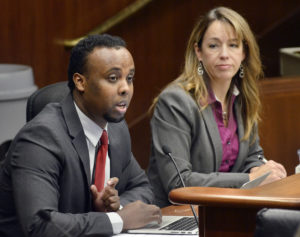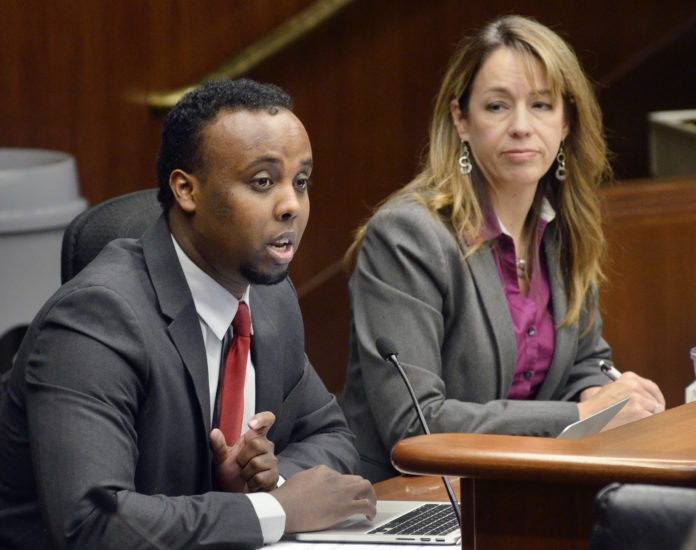
Alpha News reported back in March about a 2-year $1.35 million request for state funding from Ka Joog, a non-profit whose mission is to “enrich the life of Somali American Youth.” The group– whose last tax return listed $199,164 in annual contributions–sought $4.25 million in taxpayer funding this legislative session and found support in St. Paul. Ka Joog has offered their services as a solution to the growing threat of radicalization in the state’s Somali community and hired lobbyists this session to secure more state funding.
Funding requests had bipartisan support this year with the $1.35 million request authored by Rep Dave Baker, R-Willmar. Ka Joog was ultimately awarded $250,000 over 2-years from in the omnibus legacy bill to be directed to it’s “Fanka- Invisible Art” program to expand to Minnesota cities with large Somali populations including Willmar, Rochester, and Mankato. It currently operates in Eden Prairie, Minneapolis, and St. Paul.
Another bill, HF 1515 authored by Rep Roz Peterson, R-Lakeville, sought to allocate $1.1 million to Ka Joog for a workforce development pilot program and another $1.9 million to expand their Take Off after-school program in partnership with the University of Minnesota. This funding didn’t make it through the legislative session.
Ka Joog was profiled last year on WCCO about their efforts to stop Somali youth from being recruited by Al -Shabab. They traveled to Washington D.C. in 2014 to brief Congress and participate in a White House conference to combat extremism and made a previous trip to the White House in 2012 to meet President Obama and brief Congress.
Alpha News took a look at the organization’s 990 filings as a public charity and here’s what we found:
For the 2011 filing (8/1/11-7/31/12) the organization took in $91,950 in contributions, gifts, and grants. There is a $71,600 grant listed for the “first (phase) of the Fanka program” with $19,671 spent to hire “four spoken word artists to participate (in) the session poetry workshop.” The organization paid out $12,194 Salaries and compensation and $6,169 Professional fees and independent contractors and listed had a fund balance of $68,314 by the end of their fiscal year. In 2012 Ka Joog was awarded a $68,000 taxpayer-funded grant through the state arts board to “partner with local Somali-run organizations, and engage local, national, and international Somali artists to create, teach, present, and document the Somali oral traditions of poetry, storytelling, and music. ” Three of the eight board members appear to be related and were listed living at the same residence in Eden Prairie, including Mohamed Farah who is the current Executive Director, Abdi Farah who is the artistic director and Ibrahim Farah who was the treasurer.
In 2012, their tax filing included $46,400 in grants to support various programs. Ka Joog spent $11,426 for their trip to D.C. and a trip to Canada. $26,896 to host Somali Independence Day and other community gatherings. $16,451 was spent on contracted services, $18,451 in professional fees and independent contractors, and $20,755 in rent. The previous year’s rent was $5,263.
In 2013, the group listed $199,164 in contributions. Two-thirds of that money was spent on salaries, professional fees, travel and auto expenses: $32,788 salaries and compensation, $63,915 professional fees and independent contractors, $28,929 travel and conferences, and $6,465 auto expenses. $48,032 was spent on the Somali Independence Day celebration. The rest of the money was spent on programming, including $6,017 for the Fanka program–which will now be funded $250,000 to expand. $36,693 was spent on the Take Off after-school program which some legislators wanted to increase to $1.8 million over two years.
2014 990’s weren’t available.
Previous public money came from the Metropolitan Regional Arts Council and the Minnesota State Arts Council. The organization was awarded privately-funded grants in 2014 from the Headwaters Foundation for Justice, an organization founded by Governor Mark Dayton’s ex-wife Alida Messinger, the Knight Foundation, and the Mardag Foundation.
Ka Joog announced an ambitious $15 million 5-year public-private funding plan this year and their work to establish and strengthen relationships at legislature this session could pay off in even more public money down the road. With no concrete data to conclude whether arts and after-school programs stop international terrorists from recruiting in Minnesota, the idea alone can draw more taxpayer dollars as politicians seek solutions to the threat.











